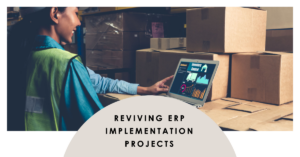Successfully Reviving ERP Implementation Projects: Lessons Learned from a Challenging Journey
Taking over failing ERP implementation projects can be a daunting task for any Microsoft Partner. The pressure to deliver results within a tight budget and schedule can be overwhelming, especially after the Client has experienced previous setbacks. In this blog post, we will explore the real-life scenario where we stepped in to salvage an ERP implementation project. We will delve into the strategies and lessons learned that enabled successful project completion within constraints, with a particular focus on the adoption of the Carabao Implementation framework to control scope and plan deliverables.
Understanding the Initial Challenges:
Upon taking over the D365 Implementation project, we faced significant challenges due to the time and resources that had already been wasted. Budget constraints and a tight delivery schedule added to the complexity of the situation. It was crucial to assess the existing project status, identify gaps, and develop a clear roadmap for moving forward.
Introducing the Carabao Implementation Framework:
To regain control and ensure successful project completion, our Client agreed to adopt our Project Implementation framework. This framework provided a structured approach to manage the implementation process effectively, control scope, and plan deliverables. Its key principles included stakeholder engagement, project governance, transparency, and continuous communication.
Assessing and Realigning the Scope:
The first step in the Carabao Implementation framework involved a thorough assessment of the project scope. This included a detailed analysis of the original requirements, existing deliverables, and any modifications or additions required to meet the desired outcomes. By aligning the scope with the project objectives, the company could avoid unnecessary complexities and focus on delivering the most critical functionalities.
Planning and Resource Allocation:
With a clear scope in place, the company developed a comprehensive project backlog that accounted for the limited budget and time constraints. Resource allocation from both the Client side and our team played a crucial role, ensuring that the right key users were assigned to specific areas of expertise. The Carabao Implementation framework emphasized effective time management to optimise productivity and minimize delays.
Agile Methodology and Iterative Approach:
To maintain momentum and deliver results efficiently, the company adopted an Agile methodology and an iterative approach to implementation. This allowed for incremental progress, continuous feedback loops, and regular course corrections. Agile principles such as collaboration, adaptability, and flexibility were integrated into the project management approach, fostering a responsive and dynamic environment.
Stakeholder Engagement and Communication:
Throughout the project, the company prioritised stakeholder engagement and transparent communication. Regular updates, progress reports, and interactive sessions with key stakeholders ensured alignment, managed expectations, and built trust. This approach helped mitigate any concerns arising from the previous partner’s setbacks and fostered a positive working relationship.
Conclusion:
Reviving failing implementation projects is a challenging yet rewarding endeavour. By adopting a structured framework and embracing key principles such as scope control and deliverable planning, we can help your organisation successfully navigate through tight budgets and schedules. We seek a long term collaboration that goes beyond project completion. Let’s embark on a journey of continuous growth and success.
Clive Scerri
Share this article
Follow our Blog







